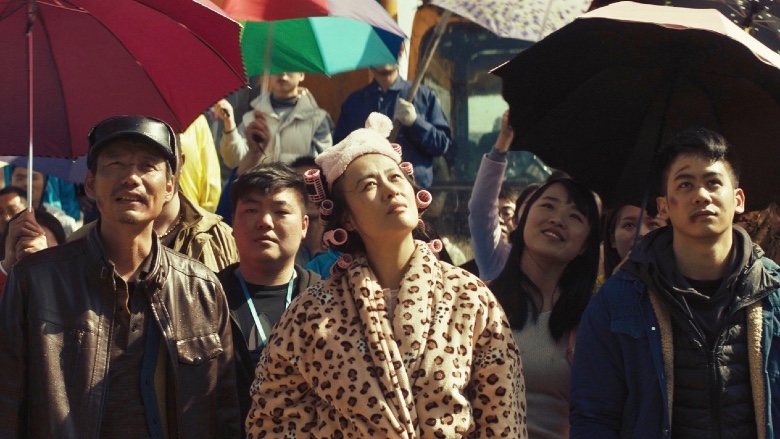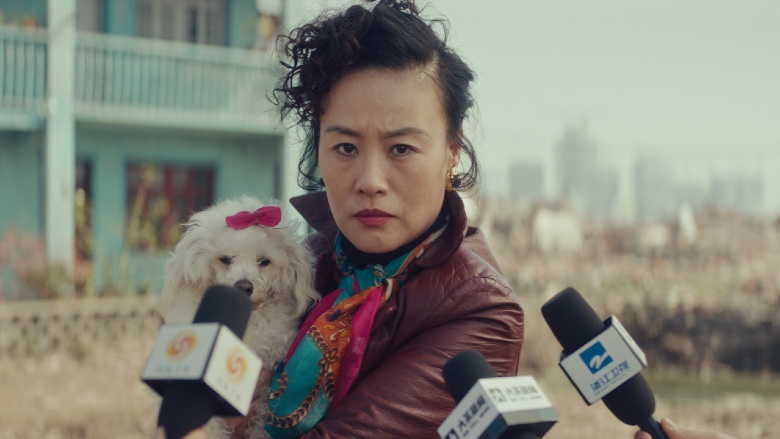
In the year 2020, before everything all went to hell, Director Cathy Yan’s first major studio film, Birds of Prey and the Fantabulous Emancipation of One Harley Quinn, starring Margot Robbie, was released, becoming the first major studio superhero movie directed by an Asian-American woman.
The world at large probably didn’t know much about Ms. Yan before she made Birds of Prey, but it was actually her second feature after a Chinese political comedy called Dead Pigs, which premiered at the 2018 Sundance Film Festival with very little fanfare. Obviously, the right people saw Dead Pigs, because Yan was given the meeting to direct what would be the first of only two Warner Bros. superhero movies last year.
Three years later, Yan’s debut feature is finally getting a U.S. release via streamer Mubi, and it’s a spectacular political comedy set in Shanghai where thousands of dead pigs have shown up in the waterway there. The film follows a number of Chinese and American characters whose lives are tied into the cultural development of the area, including a farmer named Old Wang (Haoyu Yang), his tough-as-nails sister Candy Yang (Vivian Wu), who owns a local beauty salon, Old Yang’s ambitious son Zhen (Mason Lee), and Xia Xia (Meng Li), the beautiful but vain high society girl Zhen falls for.
Below the Line spoke with Ms. Yan over Zoom for the following interview, and we not only spoke about making her first movie in China but also some of the differences between that and her second movie which was an American studio film. Despite her recent studio debut, it certainly sounds like she’s going to continue working in the indie film space, as well.
Below the Line: I remember when you were announced to direct Birds of Prey, and I realized you directed another movie that premiered at Sundance, so I figured it was a tiny indie, but I could never find it anywhere. But thanks to Mubi, we can finally watch it here, and it’s nothing like I expected since this is a pretty big Chinese production. After making a few shorts, what made you decide to make your first feature in China? Although it does have a bit of an American influence on what’s otherwise a Chinese story.
Cathy Yan: Definitely. I think it felt right for me. I went to NYU, and so I don’t think it was this deliberate, but I felt like the story that I could tell that felt like me and was unique to me would be something that really expressed that duality, and that multiple identity. I was born in China, raised in the US, but then I’d spent a lot of time back there. I had such a specific experience back there, that it just felt right, as opposed to just trying to do another quirky comedy in Brooklyn. Even though it was made four years ago, I’m still very proud of it, and I’m proud that it has like a pretty unique tone to it, too, that I sort of developed over the course of film school, I think, to be much more in line, I think, with, frankly, the sense of humor that I have.

BTL: What got you interested in writing about this particular story?
Yan: I had heard about this incident where 16,000 dead pigs are found in the river. I had been a reporter in China as well, and so it just kind of naturally came to me. I actually wrote the first draft of the script over the course of a few days, in my final semester of film school, and then it became really real. I don’t remember making the decision of, “Alright, I’m going to become a director and I’m going to make movies.” It was more like I really want to make this movie. It never occurred to me to not be the director of the movie, because I knew that it was very personal to me, and that I was the only person that could really direct it. It’s actually in English, Mandarin as well as a Shanghainese dialect. It all was very sort of instinctual and organic in terms of getting to make the movie.
BTL: I was quite impressed by it. It was a much bigger production than I expected with a lot of locations. You did use some Western people on the movie, so did you meet them here and then brought them to China?
Yan: It was really fun to actually do this thing that I don’t know has really been done before. I think there’s co-productions at a bigger scale, but this indie version was really just like me, I’d written the script here, and then I would fly back and forth between here and China to try to get funding for it and starting to put together the movie. Pre-production was all in China, but I brought over Federico Cesca, the amazing cinematographer on it, who I knew from film school. He went to NYU with me, and we were close friends, and then most of the department heads we hired in China, but also were very deliberate about trying to find people that were a little more global, and less just like be very, very local crews, because also, the way that you shoot in China is actually quite different. Like the role of the AD is a little bit different, so we just wanted to make sure to stick to the more Western model, because it was what I knew and then my producers are incredible. They’re both Chinese women, but they’re both very westernized, I would say, so they really understood the script. That was a huge part of it was just finding people that really understood the perspective and finding like-minded people.
Then after that, because I’m based in New York, I wanted to cut in New York. So we actually did post-production in New York partially for the credit. There’s a nice post-production credit here, too. You have to think about these things for indies in New York, but also because I wanted to make this field distinctly not like an art house foreign language film, of which there are references for that. A good example is that I have two executive producers on the film. One is Zhangke Jia, who, is a very respected sort of Chinese auteur, whose work is very much like the classic Chinese, well-respected arthouse movie. And then I have Ali Wong as my other executive producer, and she kind of represents more of that American side of things. It was a very conscious decision to bridge these two cultures. We cut in New York, actually, in my living room, and I worked with Alex Kopit, an amazing editor who doesn’t speak a lick of Chinese. But I actually liked that, too. I felt like a lot of cinema really transcends language, and I kind of like the idea that he edits and picks performances purely based off of performance, and not what they’re saying.

BTL: I don’t usually ask about working with actors for Below the Line, but I mean, Vivian Wu is kind of a legend, the movies she’s made. Was your Chinese producer helpful in getting her by just sending her the script?
Yan: Yeah, I mean, I always said there were two people that could have really played the role of Candy because of the language abilities and so much of the movie was this cross-cultural international element to it. As soon as I met Vivian it just felt right, and she really loved the script. She is kind of Candy in many ways – she’s very vivacious and hilarious, and she understood it, I think. It is a very global perspective on China, too, and so she really got and understood the script. We also have Maison Lee in it, too, and he is super interesting. He is Ang Lee’s son and actually grew up in the US and was born in the US, but then decided – partially because he wasn’t getting the roles that he deserved to get in the US. He moved to China, and kind of got back in touch with his roots, learned Chinese, and then was acting there. We found him in in China, and so a lot of the crew and cast have this interesting, bicultural story to them.
BTL: I do want to ask about the production design, because Candy’s house alone was just amazing. Who did you get to do that and did you do a lot of drawing or sketches while you were writing the script or have many ideas about how that should look?
Yan: Yeah, so a great production designer named Joe Yao — he’s based in Shanghai. I think he was mostly doing commercials, actually, but he had really good taste, and the house was so deeply important that I started scouting the house like even before I had financing for the film. We didn’t have money for VFX or anything like that, so what you see is really what you get. We actually managed to find a village that over the course of the last few years was just getting slowly demolished to be turned into like this new financial center in Shanghai. So you’re actually witnessing this modernization and the repercussions of that modernization. Actually standing there is very, very emotional, because you kind of feel like this battleground. You see all these people leave their belongings behind, too, so if you look in the rubble, you’ll actually find stuffed animals and toys and clothes and just like things that have been left behind.
The house itself, Candy’s house, was already kind of in a state of disrepair by the time we found it, because I was also making sure that around it would be as desolate as you see in the film itself. We kind of had to resurrect it from the dead. It was yellow. We painted it that sort of turquoise blue. Everything was shot on location, and so not all the rooms were finished but the rooms that we wanted to shoot in we refinished again. A lot of that aesthetic came actually from the character. I think Candy is a vibrant, vivacious, spicy character. I always saw her as someone that just like had a lot of colors and a lot of like layers to her. And then when we were scouting houses, we found this one, and we’re in the bathroom and the bathroom again was totally in disrepair, but the bathroom was pink and the toilet was pink. In that moment, I was like, “This is the house. I know it to be the house,” so we actually kind of kept some of the elements of the house that seemed to just work. I felt like a good sign that it was the right house for the movie.
BTL: After seeing this movie, I do see connections between Dead Pigs and Birds of Prey – both very colorful movies, your sense of humor. I’m not sure if most people would have gotten that connection, but after watching your first movie, all that color stuff from Birds is all there. You’ve now had a chance to work with Chinese crews before doing a Hollywood movie with an American crew, which probably meant more union stuff. Can you talk about those two experiences and how they compared?
Yan: Yeah, like I said, we wanted to try to find crew that hadn’t worked in the Western method, if you will, because there is a pretty Chinese method, and there are no unions there. It’s a lot of just whatever the director says goes, and they’ll just work themselves to death. I actually wanted to not do that, so we were mostly looking for crew that are either bilingual, or worked with co-productions, commercials, oftentimes, because the commercials would have a Western element to it, or like Western clients and whatnot. Even just the language, because my DP didn’t speak any Chinese, and I’m bilingual and we had a bilingual AD, but we had to hire a key grip that wasn’t really a key grip, but was bilingual, so he became sort of the translator for that team. And then we also had an additional AC that didn’t just pull focus, but also kind of was a translator as well. We just wanted to make sure that at every touch point, like my DP felt completely comfortable, so that there wasn’t too many miscommunications and whatnot.
The style ended up, because I think of these deliberate choices, felt very familiar to me as in America, and the Chinese crew just worked so, so hard. I think for a lot of them, it was very meaningful to work on something that felt a little more authentic or had some artistic intent behind it. So yeah, I really enjoyed my experience actually on both productions. All of the below-the-line people I’ve ever worked with are my heroes, and I just adore them. I couldn’t have been more happy and more inspired by everyone.

BTL: Are the roles comparable between the two places, like do they have specific Chinese words for “grip” or “gaffer” or do they just have different words or meanings?
Yan: They do a little bit. I think the AD is probably the one… they schedule less. I think they’re more like an actual assistant to the director in China, but again, we found an ad that had worked on Western stuff, so understood all the responsibilities for that job. I think I would guess it’s because they’re not unionized, so the idea of having, frankly, like a time limit is just not as much of a thing there. I think the main thing I really wanted was to make sure there was a professional AD on my set.
BTL: I like how modern the movie is, because I feel like a lot of the Chinse movies here, and I do see a lot, tend to be more period pieces. I feel like this has a fairly pointed commentary, and I know this opened in China a few years ago, so how was it received there?
Yan: Probably the same. I mean, I don’t think it’s like the easiest movie to sort of understand or wrap your head around, and so I think, there’s a faction of people — including a lot of the people who’ve worked on the film — that really loved and understood the script, and embrace it, but then China’s a really large country, so I think there’s also a lot of people that just weren’t interested in any material that isn’t escapist. I think we face the same issue here, right? There’s a bunch of people that are — especially with the world being what it is – “I don’t want anything difficult. I just want to escape into a fantasy land.” I think we try to strike a tone where it’s not too dour and dark, because I think a lot of arthouse cinema can sometimes be very much that. We try to have a little bit of light and comedy to it, but at the same time, I am very interested in, and kind of only interested in, stories that are somewhat challenging and kind of make you think about things or rethink things. I think there’s different types of people, and they want different things out of the precious little time that have to enjoy themselves and watch things.
BTL: How are things going on the Jenny Zhang thing you’ve been developing. Have you been using this time in quarantine to work on that, and do you think you might be able to start shooting soon?
Yan: Yeah, it’s tough right now, to be honest. It’s been great. I’ve actually really enjoyed this time period, because it allows me to just work on development, just write, and through that, we’ve actually expanded and we’re now developing a whole bunch of different things, other features, television shows, and whatnot. Yeah, it’s a little dicey in terms of when you can really start to shoot again, and even just like what indie films will look and what that distribution model looks like. That’s why I think also, releasing Dead Pigs in this time on a global platform, without even worrying about box office and theatrical, I think will be a really interesting and informative experience, because I don’t think this is going to go away, right? There’s this whole other new model of how you make independent films and where it goes and where it lives and what the lifecycle of it, I think, is something I’m really interested in. It’s a bummer that we didn’t get to shoot it this year or as quickly as I would like it to, but I also think the whole world is changing, so we have to adapt to that.
Dead Pigs will be available on Mubi starting Friday, February 12.
All photos courtesy of Dead Pigs; photographer Federico Cesca.





